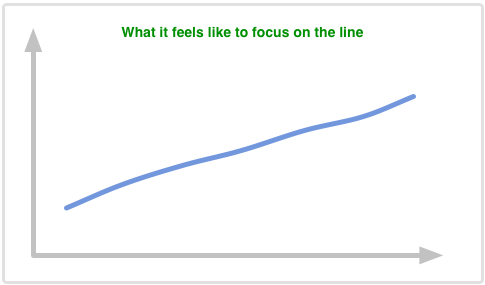Focus on the line, not the dot
January 2, 2013starting up

Yesterday I noticed the Who’s Hiring? thread pop up again on Hacker News. If you’re hiring, it’s a great place to share that fact. Since around half a year ago, we’ve been actively hiring and so I’ve made it a task of mine to post to the thread when it appears on the first of the month.
As I sat down to write the listing for Buffer in the thread yesterday, the writing came very easily. At the same time, those words I wrote on that thread have had a huge impact. The listing itself gained 11 points and was placed 2nd out of all job listings. In the hours that followed, I have received over 30 emails from super interesting people interested in joining the team.
One thing I realized is that the blogging is the reason that this happened. I’ve now written over 70 articles on this blog, mostly around 700-800 words. That’s over 50,000 words I’ve written, and I would guess that by writing that much you are only going to get better. That’s why it came so naturally for me to write that job listing.
How focusing on the dot feels

You see, what I’ve found is that if I ever stop and try to focus too much on any single article, and try and have a massive impact with one specific article, it becomes very unfulfilling. Although there are one or two article which have had a tremendous impact for me, I had no idea at the time I was writing them.
The way I see it is that when you focus on the dot, you focus on your impact between one workout and the next. You focus on your writing between one blog post and the next. You focus on the quality of your code between one line and the next. This is mostly going to result in disappointment.
As Jess Lee theorised in Why Startup Founders are Always Unhappy, if we focus on a single point in time, we are likely to be less happy.
How focusing on the line feels

I find one of the most exciting things to be thinking about the line I’m creating with my gym routine. Since I started measuring my bench press performance, I have increased the weight by fifty pounds in six months.
With almost every exercise I do at the gym, I put the weight up by a tiny amount each week. This happens every single week. One week to the next doesn’t feel like huge progress, but if I just extrapolate that trend out, it means that within a few months I am going to be lifting a further twenty or thirty pounds on the bench press. There’s no way I’ll be able to do that without having a higher muscle mass, so therefore in a few months I am going to be in better shape.
Start thinking about being a line
So, my conclusion from all of this is that personally I am much more focused on daily habits and consistency than any single point or any future goal.
Mark Suster said that he invests in lines, not dots. His advice for us as entrepreneurs is to treat our fundraising strategy as a line, not a dot:
dont allocate two months of each year to hardcore funding activities but allocate a regular amount of time each month to it like any other job function.
Ira Glass has a fantastic video which hints at this idea too:
There is a gap. That for the first couple of years, that you are making stuff, what you are making isnt so good. Its trying to be good, it has ambition to be good, but its not that good.
The most important, possible thing you could do is to do a lot of work. Do a huge volume of work. Because its only by actually going through a volume of work that you are actually going to catch up and close that gap.
Are you focused on dots when you might make more progress by focusing on lines, by thinking about consistency?
Photo credit: FullyFunctnlPhil
